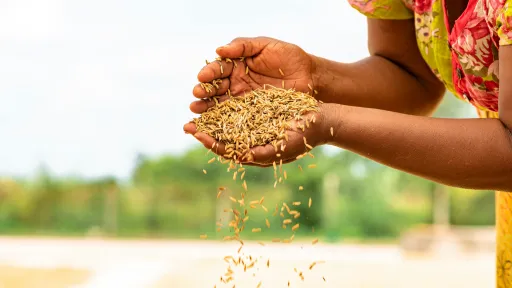
Agriculture is the backbone of Africa, supporting millions of livelihoods and feeding a growing population. In 2025, agritech is stepping up to tackle the continent’s unique challenges—climate variability, smallholder dominance, and limited resources. From precision tools to blockchain, here are the top trends reshaping African farming this year. Whether you’re a farmer, policymaker, or innovator, these developments promise a brighter, smarter future.
Key Agritech Trends for Africa in 2025
1. Precision Agriculture: Maximizing Every Drop and Acre
In a continent where water and arable land are precious, precision agriculture is a game-changer. Using drones, sensors, and AI, farmers can monitor soil and crops to optimize water and fertilizer use. In Kenya, startups like Apollo Agriculture provide satellite-based insights to smallholders, boosting yields affordably. With the global precision farming market set to hit $21.4 billion by 2030 (Vantage Market Research), Africa’s adoption is accelerating to meet food security goals.
2. Autonomous Systems: Easing the Labor Load
Labor shortages and rising costs are pushing African farmers toward automation. While full-scale robotic tractors (like John Deere’s CES 2025 models) may be out of reach for many, simpler solutions—like solar-powered weeders in Nigeria or autonomous irrigation systems in Ghana—are gaining traction. These tools reduce drudgery for smallholders, who make up 80% of Africa’s farmers, according to the African Development Bank.
3. Artificial Intelligence: Smart Farming on a Budget
AI is bringing big brains to small farms. In South Africa, platforms like Aerobotics use AI to detect pests and predict yields, helping farmers act fast. For Africa’s tech-savvy youth, affordable AI tools—often delivered via mobile apps—are leveling the playing field. Agritech Digest highlights generative AI as a 2025 standout, offering real-time advice tailored to local conditions like drought or floods.
4. Sustainability and Regenerative Agriculture: Restoring Africa’s Soil
With soil degradation affecting 65% of Africa’s arable land (UNCCD), regenerative agriculture is critical. Tech supports this shift—sensors track soil health, and bio-fertilizers replace costly imports. In Zimbabwe, initiatives like the Pfumvudza program pair precision tools with conservation farming, cutting carbon and boosting resilience. This aligns with global sustainability drives, like Europe’s Green Deal, but is uniquely African in execution.
5. Internet of Things (IoT): Connecting Rural Farms
IoT is bridging Africa’s rural gaps. Smart sensors monitor weather and soil moisture, sending alerts to farmers’ phones—even in remote areas. In Uganda, SunCulture’s IoT-enabled irrigation systems help smallholders save water and energy. With farm management systems growing at a 16.97% CAGR through 2030 (EOSDA), this tech is key to modernizing Africa’s fragmented farming landscape.
6. Blockchain: Trust in Every Harvest
Africa’s food markets thrive on trust, and blockchain delivers it. By tracking crops from farm to market, it cuts fraud and ensures fair pay for farmers. In Ethiopia, coffee growers use blockchain to verify exports, fetching premium prices globally. Research and Markets predicts this market will reach $948 million in 2025—a huge opportunity for Africa’s agribusinesses to shine.
7. Digital Twins: Testing the Future Virtually
Digital twins—virtual farm models—are new to Africa but hold promise. Imagine testing crop strategies without risking a season’s harvest. While still emerging, pilot projects—like the University of Nebraska-Lincoln’s corn field twin—could inspire African universities or startups to simulate solutions for local crops like maize or cassava. It’s a bold step toward data-driven farming.
Why This Matters for Africa
Africa’s agritech boom is about more than tech—it’s about survival and growth. With 60% of the world’s uncultivated arable land (World Bank), the continent is a hotspot for innovation. Events like the Africa AgriTech 2025 conference in Cape Town are spotlighting these trends, tailoring global best practices to local needs. Investment is rising too—AgFunder notes a 38% funding spike in Asia-Pacific agrifoodtech, signaling a global wave Africa can ride.
The African Advantage
Smallholder farmers, tech-savvy youth, and mobile penetration give Africa an edge. Trends like IoT and AI fit perfectly with the continent’s leapfrogging style—skipping outdated systems for cutting-edge solutions. Governments are on board too, with initiatives like Nigeria’s Digital Agriculture Strategy pushing adoption.
What’s Next?
In 2025, expect Africa to adapt these trends creatively—think affordable drones, mobile blockchain apps, and climate-smart regenerative tools. The goal? A resilient agriculture sector that feeds Africa and exports to the world.
Join the Agritech Revolution
How could these trends impact your farm or community? Dive into our resources or share your thoughts below—we’d love to connect with Africa’s agritech pioneers!